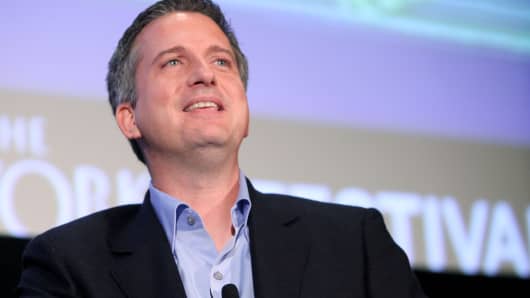A few days ago, Bill Simmons, Jim Miller and Bryan Curtis convened on Bill's podcast to analyze and critique the recent moves at ESPN.
Given that Simmons spent 12 years working at ESPN, Jim Miller wrote a book about the company and Bryan Curtis is an esteemed media critic, the three are certainly highly qualified to state what mistakes they think ESPN management has made in the past few years.
Yet, I think there were several holes in their critiques. Let's go through them.
Critique 1: ESPN was slow to understand cord-cutting
At one point in the podcast, Simmons asserts "In 2013, [ESPN management] had no idea that cord-cutting was coming." The implication is that they were asleep at the switch.
Disney reports its annual subscriber numbers at the beginning of its 10-K filing with the SEC in November. Those figures are based on the Nielsen numbers from the preceding September.
The highest subscriber number on record for the main ESPN channel was 99 million in September 2012. By the next year, the main ESPN channel was down to 95 million.
The numbers continued to decline each year after that. But nobody on Wall Street or anywhere else seemed to be worried -- media stocks had performed incredibly well coming out of the 2008 financial crisis. Disney's stock had gone almost straight up from less than $16 in 2009 to $120 on July 31, 2015.
I raised the issues of how the declining subs were going to threaten Disney's stock in July 2015 in this article called "Short ESPN" (which was published a few weeks earlier in my Tech & Media Email).
A couple of weeks later, Disney CEO Bob Iger revealed on his quarterly earnings call that ESPN had experienced "some subscriber losses." The stock immediately fell 9%, taking down other media stocks as well. Disney's stock price is still 13% below that all-time high 2 years later.
So ESPN may have been slow, but so was almost everybody else.
What about Simmons himself? Did he bang the drum about subscriber losses back in 2013? No. He admitted that when he gave an interview with Peter Kafka of Recode in March 2015, he had no idea that cord-cutting was such a serious issue.
Critique 2: ESPN was too slow to support podcasts
Simmons complained as early as 2015 that ESPN management never monetized his popular podcast. He still argues that they missed out on a big growth area.
While Simmons' podcast popularity then and now is undeniable (he's currently the 5th most popular sports podcast on Apple Podcasts' rankings), podcasts are a tiny business compared with ESPN's overall revenue.
In public filings, Disney doesn't break out exactly how much ESPN makes for the company, but some basic calculations suggest ESPN booked around $14 billion in revenues for Disney in 2016. (My math: If you add up affiliate revenues by ESPN channel according to SNL Kagan, that's $10 billion a year. Disney's cable networks do $8 billion a year in direct ad revenue, and I'm assuming a 50/50 split between ESPN and ABC.)
Even if that math is slightly off, the entire podcasting industry booked $167 million in revenues last year and $34 million in 2015, according to Bridge Ratings.
I would argue that John Skipper did nothing wrong in 2015 by trying to sell another big advertising sponsorship deal that included podcasts in addition to several TV shows, rather than worrying about Simmons reading midrolls so they could grab a fraction of a $34 million business.
And by the way, who has the number one and number three sports podcasts today? ESPN with 30 For 30 and The Woj Pod. Sometimes being second to the party works as well as being first.
Critique #3: ESPN digital is way behind the competition
Simmons lambasted the ESPN website and app for being behind the competition. He states at one point that Bleacher Report is "way better at social and driving traffic" and that they are "three to four years ahead" of ESPN in their thinking. He says that the Undefeated is too "text-heavy."
Yet, according to the February rankings from ComScore, ESPN is the #1 digital sports media property. Bleacher Report was 8th.
Simmons says that he told now departed VP of digital exec John Kosner several times that ESPN should open an office in Silicon Valley in order to get access to the best talent. Yet, there are management difficulties in running a satellite office and there certainly would have been a much higher cost paying salaries in Silicon Valley versus in Bristol, Connecticut. Would ESPN have been better off? Perhaps. But, again, ESPN is the number one sports destination. How exactly were they being hurt?
Bryan Curtis is correct at the end of the podcast is concluding that ESPN now needs to determine (1) what sports rights it will bid for in the future and (2) what its identify is going to be (e.g., more SportsCenter, more debate shows, other newer shows, a new focus on growth areas like podcasts). These are critical questions.
I would add that ESPN also needs to demonstrate to Wall Street how quickly it can grow a new stream of revenues from digital services which might offset and then grow beyond lost linear subscribers. Nobody expects much from those new digital services. They assume it will be 24 hours of cricket. Maybe it will be actually very popular.
ESPN is far from a perfect media company. It's facing serious challenges -- just like every other media company. Because it's one of the biggest and most profitable, it draws intense scrutiny and criticism. Some of that criticism is fair but some is not.
I would much rather be in their strong financial and market position to manage this transition.



